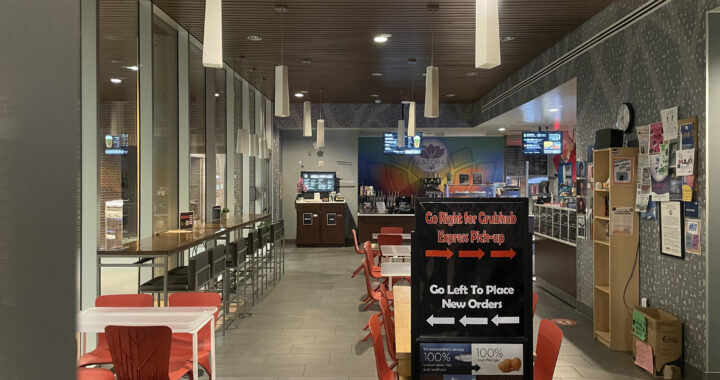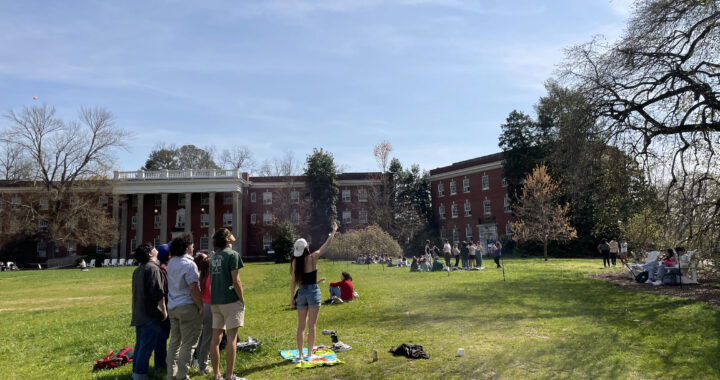The Like Whatevers: Smarter than Your Average Band
5 min readBY JOHN SHERIDAN
Kelsey Mayo of the Like Whatevers greets me at the door and leads me all the way down to the basement of a big old house. In it some core members of the Like Whatevers are rehearsing, and I simply pull up a seat and listen.
Forrest Marquisee is on guitar, Jeremy Flax works the bass, and Jessica Hedrick wields the piccolo. Sam Protich with his mop of ginger hair is in the center of the assembly, haunched over his keyboard like a mad scientist belting into a microphone. They are working on a “re-imagining” (cover is not the preferred nomenclature) of Robert Johnson’s “If I had Possession Over Judgment Day,” and even with half the band it sounds good. Sam can barely contain his joy.
The Like Whatevers is a band of students and friends that performs in Fredericksburg. The full band in all its glory consists of nine talents: junior and music major Sam Protich on keyboard and vocals; junior Jessica Hedrick on flute, piccolo, and vocals “but only when everyone else does;” junior Jeremy Flax on bass and sometimes vocals; junior and music major Forrest Marquisee on guitar and vocals and sometimes keyboards; junior and music major Nate Masters on tenor sax; sophomore and music major Kelsey Mayo on vocals, flute, and tambourine; sophomore and music major Jordan Bloom on guitar and vocals; freshman Glenn Gatzke on drums; and finally, alumnus Matt Bradshaw plays trumpet, harmonica, the shaker, “and occasionally yells.” Junior Julie Burns, for the record, is the band Mom.
Their sound defies any precise written description. The only way to know The Like Whatevers is to hear and see them play. For the sake of the band and their talent I just won’t attempt comparisons. They speak for themselves.
The band began as a project between Marquisee and Protich. The two lived on the same floor of Bushnell in ’07-‘08. The name, as you can imagine, came without much difficulty.
“Last year, me and Forrest one night were making a song called ‘Hi Mom Hi Dad’, and we were thinking we should make a band with this, and we thought ‘well what should we call this?’ and someone said ‘you know, like, whatever,’” said Protich.
“It sounds kind of bratty, and indifferent, which is cool because we’re setting up expectations of a rock n’ roll indifference kind of band, but we’re really not that way. So these are expectations to subvert with the way we perform and the way we create songs.”
The band of nine that exists today came about from a sort of snowballing of musical connections.
Protich explains, “me and Forrest were thinking we’d have a small me-him-and-Glenn thing, where we would just have this nuclear band and then take onto the stage certain people for certain songs, suiting the essence of the song. Pretty soon we gave up on that and started taking on people, which is why we have nine people.”
Flax was one of the first to join the cause. Before either came to UMW, Protich, who lives in Newport News, traveled with his band to play a show in Norfolk, which Flax, from Virginia Beach, was also attending.
“I remembered him when I came to Mary Washington because we have some mutual friends. I remembered he was into music and stuff. I wanted to play bass in a band because I’d never done that before, so I suggested to him if he needed a bass player to call me up,” said Flax.
The group’s musical armory was further bolstered by the instrumental guns of Matt Bradshaw and Nate Masters. “Getting Matt Bradshaw and Nate to play with us has been a series of beggings and wishings and hopings, and it’s happened. They’re both pretty busy,” said Protich.
“Fortunately for us they’re insanely talented, so they can just pick up on everything immediately,” added Flax.
Jordan Bloom is an original member of The Like Whatevers, and continues to be despite transferring to William & Mary this spring. “He’s definitely a full-time member,” said Flax.
Currently The Like Whatevers have nine songs in their repertoire, and more on the way. “Ay Bay Bay” is a new take on a song originally by rapper Hurricane Chris. “It’s not at all like the original,” Hedrick said.
“We don’t really have straight covers in any real way,” said Protich.
“He calls them re-imaginings,” Hedrick explained.
The song “Death Circle” is written by Protich “It’s our metal classic,” he tries to say with a straight face.
“That song I think of when I’m trying to tell people about the band, because it’s just a really weird pop song,” said Flax.
“Curious Cat” is a song written originally by Marquisee under a previous project. “It’s one of several songs we do that are originally from Forrest’s ‘Father’s Gander’ project,” explains Protich.
When prompted to describe Father’s Gander, Marquisee begins: “It’s just like, folk, folk, folk, folk…”
“But with a twist,” adds Mayo.
“It’s like mother goose, but not… like a child’s brains,” Marquisee said.
Other songs The Like Whatevers perform that are derived from Marquisee’s Father’s Gander project include “Nina Pinta,” “Shush Little Bebe,” and “Birdie Birdie.”
“They’ve been taken from that [Father’s Gander], but expanded and changed dramatically,” says Protich.
“Friend of a Friend” is a song the Like Whatevers are proud of, as they plan to have a single to release eventually. “It’s the first Like Whatevers song we’ve collectively written,” said Marquisee.
Other songs they perform include “Church and Bride” and “Love is Some That We Don’t Need.” They even do a cover of Neil Young’s “Everyone Knows This is Nowhere.”
The Like Whatevers is not a “rock band” or any band like you might imagine. They’re the kind of band you could talk to about music, or just about anything, for hours.
When questioned as to the influences on their music, Marquisee said “The smell of baked bread, and you’re seven years old, and you’ve just been circumcised again…” but then trails off with a laugh.
In the end, this band creates amazingly unique, downright addictive music, because they are doing it for all the right reasons.
“Our arrangements and increasingly our conceptions of how the songs are going to be played, is guided a lot by the instrumentation we have…the music we’ve been arranging reflects the need to incorporate all these elements in interesting and surprising ways to us,” states Protich.
“Playing music is just insanely fun, especially live, there’s no better feeling than getting up and playing for people,” Flax said, “It’s been a lot of fun breaking down the musical barriers I’d kind of boxed myself into.”
Mayo added, “It’s a good atmosphere. It’s a good outlet for me because I don’t get to sing this sort of stuff all the time, because it’s not written. It’s different, it’s really cool.”











